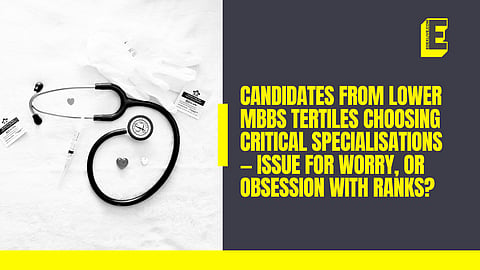

The debate on whether ranks obtained by medical students in their MBBS (Bachelor of Medicine, Bachelor of Surgery), or the National Eligibility-cum-Entrance Test Postgraduate (NEET-PG) would predict their efficiency as doctors, has rocked the medical community on social media — yet again.
This time, it was sparked by a post by Dr SP Kalantri, Director Professor of Medicine at the Mahatma Gandhi Institute of Health Sciences, on his X account.
In his post, Dr Kalantri expressed worry about the "lower tertile of MBBS graduates" choosing medical specialities like cardiology, neurosurgery, oncology and gastrointestinal medicine.
Many students and medicos responded sharply to this post, deeming it wrong to place so much importance on ranks, and let it dictate someone's perception of what medical competence looks like.
Some even stated that there was no way how someone's performance in NEET and MBBS would determine the kind of surgeon they would end up becoming.
Elaborating on this, Dr Rohan Krishnan, Orthopedic Surgeon and former Chairman of the Federation of All India Medical Associations (FAIMA) affirms, "There is no correlation between ranks and quality when it comes to medicine."
He adds that even a difference of 5-10 marks could lead to a huge discrepancy in the ranks between two candidates.
Regarding the specialisation chosen by candidates, he says that their choices are not usually informed by their ranks but rather, by other factors.
"Specialities like orthopaedics, cardiology, or surgery have a steep learning curve and involve a lot of labour. After graduation, they have to work in 12-16 hours. As interns and junior residents, you have to rely on your seniors to guide them at every step. A lot of medical students are not willing to put in that kind of effort," he explains.
Further, given the rise in violence against doctors, particularly surgeons, along with these factors, several young medical graduates are actively moving away from intense specialisations like cardiology and surgery, he says.
However, aspirants’ preferences would not always remain like this, and are subject to change based on market conditions, he adds.
On the other hand, some experts do see a correlation between academic performance, at least in their MBBS, and clinical performance.
“MBBS is a practical course and doesn’t involve just theoretical learning. It is reasonable to assume that someone good in their theory and practicals would end up a good doctor,” says Dr Arvind Pandey, Professor of Anatomy at Kasturba Medical College, Manipal.
He clarifies, however, that this must not be taken as a general rule, as “there are exceptions in every case.”
“Maybe someone who scored low in their MBBS or postgraduation might become a better doctor through practice or experience,” he says.
He adds that with medicine evolving rapidly, doctors are expected to keep themselves up-to-date — and how they performed in their medical education would not matter.
